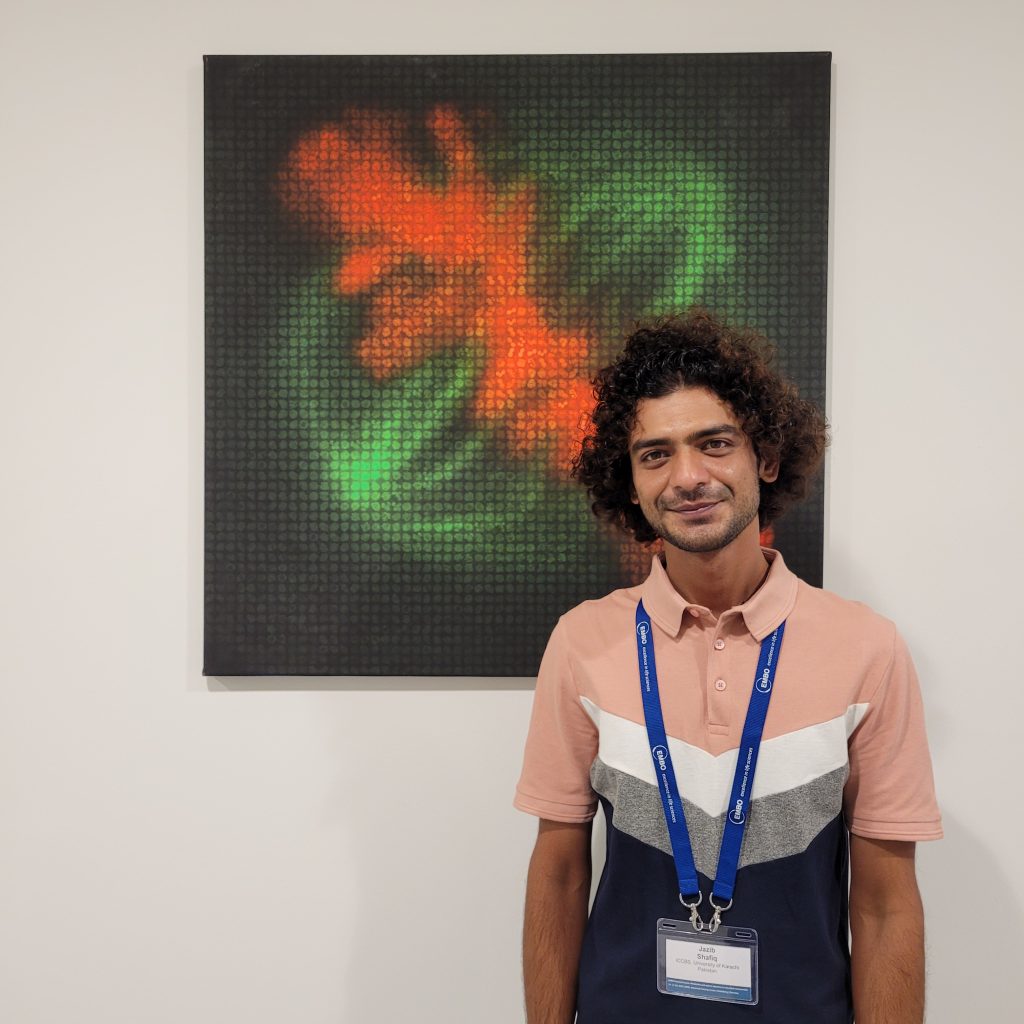Coming back for more: An interview with three-time course attendee Jazib Shafiq
Current PhD student Jazib Shafiq has attended not one, not two, but three courses at EMBL Heidelberg in the span of six years. We’re delighted to share our interview with him about why he keeps returning to EMBL and how our training has benefitted him in his career. Next to portraying his experiences with EMBL Events, Jazib also gives some great insights on what to expect when coming to Heidelberg, and especially what to visit when you’re here yourself!

Can you tell us a bit about yourself and your research?
I am from a small village near Faisalabad, Pakistan, and live in Karachi, where I am currently pursuing a PhD in Molecular Medicine at International Center for Chemical and Biological Sciences – University of Karachi, Pakistan. I am an introvert by nature, and like reading literature (novels and poetry) from distinct cultures and languages. My book collection includes titles from over 25 countries. My favorite books include works by Fyodor Dostoevsky, Jean-Marie Gustave Le Clézio, Rainer Maria Rilke, Yasunari Kawabata, and Gabriel García Márquez. In addition to reading, I love to explore the world by travelling and have great affection for valleys, mountains, and rivers.
The gut microbiome–brain axis is a dynamic trans-kingdom communication system between the gut microbiome and the host central nervous system. The composition of gut microbiota correlates with the host behavioral phenotype, and perturbations in microbial communities are implicated in several neurological disorders. My PhD research project is focused on studying the role of the gut microbiome in the regulation of basal anxiety-like behavior. I am using antibiotics-induced gut dysbiosis mice model for this study and combining behavioral paradigms, gene expression, metagenomics, and mass spectrometry to study dysbiosis-induced changes in host behavior and gene transcription levels, gut bacterial genes, and the metabolome.
Which EMBL courses have you attended so far?
I have attended three training courses at EMBL:
- July 2016: EMBL Course ‘Next generation sequencing: whole genome sequencing library preparation’
- April 2018: EMBO Practical Course ‘Microbial metagenomics: A 360º approach’
- October 2022: EMBO Practical Course ‘Metabolite and species dynamics in microbial communities’
Why have you chosen to attend multiple EMBL courses?
I started working on host-microbiome interactions during my master studies. My project required understanding of sequencing techniques (16S amplicon sequencing, shotgun metagenomics), and at the time, I had no expertise with NGS. While seeking for opportunities to learn NGS, I discovered an EMBL course on whole genome sequencing library preparation. I applied, got selected, and was awarded the travel grant by Boehringer Ingelheim Fonds to attend the course. Several considerations, including EMBL’s cutting-edge research infrastructure, resources, and offered learning opportunities for researchers worldwide, inspired me to take further EMBL courses relevant to my research.
EMBL offers financial assistance to applicants with limited resources, and the interdisciplinary themes of EMBL courses are always in line with the ongoing trends in science. The best part of the EMBL courses is the practical work; it comprises more than half of the course and is designed to suit students with diverse research backgrounds. The number of participants in each course is limited, which provides more time for participants to connect and discuss projects with trainers. EMBL courses include social events like treasure hunts, downtown dinners, and guided tours of beautiful Heidelberg city. And of course, the stunning view of the Neckar and Heidelberg Altstadt from the Philosophenweg is also one of the reasons I keep returning to EMBL Heidelberg.
How has attending EMBL courses helped you in your career?
The EMBL courses I attended enabled me to learn technical skills required to conduct my PhD research, integrate new ideas in my work, and provided a platform to connect with people from various countries with similar scientific interests. These trainings were instrumental for me to carry out my experimental work and present the findings at various conferences. In ASM Microbe 2019, held in San Francisco, my work was selected for poster presentation and was chosen for a press summary to showcase it to reporters. I was awarded the IUBMB fellowship in 2020 to present my research at the Cell Symposia on Molecular Mechanisms Linking the Microbiome and Human Health in Miami, Florida, USA. My study abstract was published in the online supplement of IJID – International Journal of Infectious Diseases (DOI: https://doi.org/10.1016/j.ijid.2020.09.052), the 19th ICID, Kuala Lumpur, Malaysia in 2020. Currently, I am finishing up the experimental work and will submit the results for publication soon. After my PhD, I wish to continue working on host-microbiome interactions to learn and discover something exciting.
I am thankful to my institute, EMBL, EMBO, Boehringer Ingelheim Fonds, IUBMB and The Company of Biologists for their generous support in advancing my PhD and future scientific career.
Thank you, Jazib, for this delightful interview. We wish you all the best!
If you wish to attend EMBL courses yourself, please have a look at www.embl.org/events. We look forward to seeing you in Heidelberg or virtually.